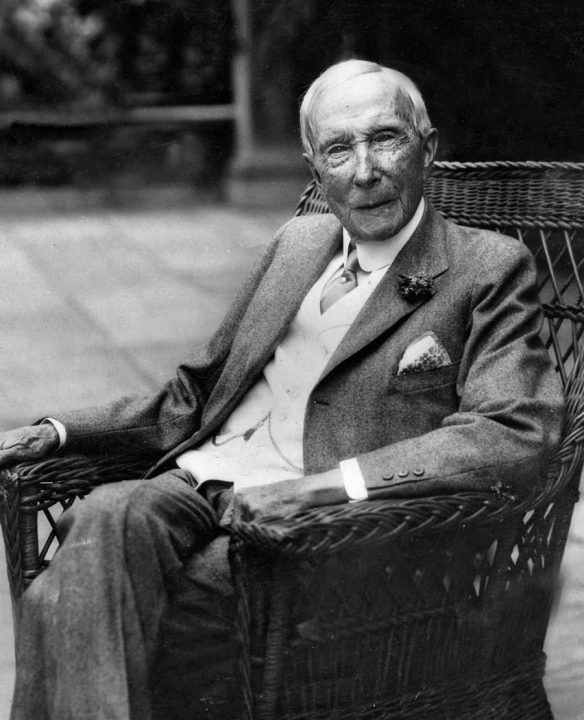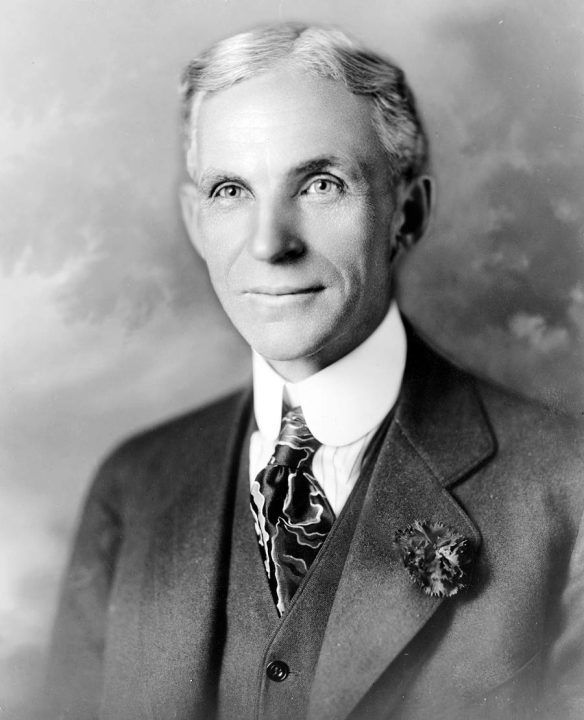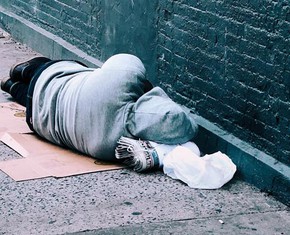The views expressed in our content reflect individual perspectives and do not represent the authoritative views of the Baha'i Faith.
Historians differ on this point, but in 1916, either John D. Rockefeller or Henry Ford became the world’s first billionaire. Today the world has 2,604 billionaires, who possess a total wealth of $8.7 trillion.

John D. Rockefeller 
Henry Ford
In 2017, Oxfam reported that the richest eight billionaires in the world own as much combined wealth as “the poorest half of the human race.”
In fact, some of those ultra-wealthy billionaires are now on track, if their incomes continue to rise, to become the world’s first trillionaires.
So the question has recently arisen among regular people, politicians and policymakers alike: should we ban billionaires?
Should the nations of the world make it impossible or illegal for one individual to accumulate so much excess wealth? Should we adopt economic and tax policies that would redirect some of those massive individual riches to the general benefit of the world’s peoples? In general, what should humanity do about the increasing disparity between the very wealthy and the very poor?
The Baha’i teachings answer those questions with these fundamental principles:
Wealth is most commendable, provided the entire population is wealthy. If, however, a few have inordinate riches while the rest are impoverished, and no fruit or benefit accrues from that wealth, then it is only a liability to its possessor. – Abdu’l-Baha, The Secret of Divine Civilization
A financier with colossal wealth should not exist whilst near him is a poor man in dire necessity. When we see poverty allowed to reach a condition of starvation it is a sure sign that somewhere we shall find tyranny. Men must bestir themselves in this matter, and no longer delay in altering conditions which bring the misery of grinding poverty to a very large number of the people. – Abdu’l-Baha, Paris Talks
Good God! is it possible that, seeing one of his fellow-creatures starving, destitute of everything, a man can rest and live comfortably in his luxurious mansion? He who meets another in the greatest misery, can he enjoy his fortune? That is why, in the religion of God, it is prescribed and established that wealthy men each year give over a certain part of their fortune for the maintenance of the poor and unfortunate. That is the foundation of the religion of God, and the most essential of the commandments. – Abdu’l-Baha, Baha’i World Faith
Along these lines, the Baha’i teachings prescribe two parallel remedies for this proliferation of massive wealth: a growing love for humanity among the rich, resulting in increased voluntary charitable giving to the poor; and the adoption of progressive policies of taxation so such gross accumulations of wealth would no longer be possible.
Abdu’l-Baha pointed out that:
… the Teachings of Baha’u’llah advocate voluntary sharing, and this is a greater thing than the equalization of wealth. For equalization must be imposed from without, while sharing is a matter of free choice.
Man reacheth perfection through good deeds, voluntarily performed, not through good deeds the doing of which was forced upon him. And sharing is a personally chosen righteous act: that is, the rich should extend assistance to the poor, they should expend their substance for the poor, but of their own free will, and not because the poor have gained this end by force. For the harvest of force is turmoil and the ruin of the social order. On the other hand voluntary sharing, the freely-chosen expending of one’s substance, leadeth to society’s comfort and peace. It lighteth up the world; it bestoweth honour upon humankind. – Abdu’l-Baha, Selections from the Writings of Abdu’l-Baha
The Baha’i teachings, however, also call for a balance of voluntary philanthropy and governmental policy that functions to abolish extreme poverty:
One of the most important principles of the Teaching of Baha’u’llah is: The right of every human being to the daily bread whereby they exist, or the equalization of the means of livelihood.
The arrangements of the circumstances of the people must be such that poverty shall disappear, that everyone, as far as possible, according to his rank and position, shall share in comfort and well-being.
We see amongst us men who are overburdened with riches on the one hand, and on the other those unfortunate ones who starve with nothing; those who possess several stately palaces, and those who have not where to lay their head. Some we find with numerous courses of costly and dainty food; whilst others can scarce find sufficient crusts to keep them alive. Whilst some are clothed in velvets, furs and fine linen, others have insufficient, poor and thin garments with which to protect them from the cold.
This condition of affairs is wrong, and must be remedied. Now the remedy must be carefully undertaken. – Abdu’l-Baha, Paris Talks
This vision of a more spiritual future foresees the elimination of the extremes of poverty and wealth through the combined effects of both philanthropy and policy:
Baha’u’llah set forth principles of guidance and teaching for economic readjustment. Regulations were revealed by Him which ensure the welfare of the commonwealth. As the rich man enjoys his life surrounded by ease and luxuries, so the poor man must, likewise, have a home and be provided with sustenance and comforts commensurate with his needs. This readjustment of the social economy is of the greatest importance inasmuch as it ensures the stability of the world of humanity; and until it is effected, happiness and prosperity are impossible. – Abdu’l-Baha, The Promulgation of Universal Peace
Essentially, the Baha’i teachings suggest readjusting the social economy of humanity through a system of progressive taxation, where the tax rate increases as the amount of taxable wealth also increases:
Baha’u’llah has revealed principles and laws which will accomplish the adjustment of varying human capacities. He has said that whatsoever is possible of accomplishment in human government will be effected through these principles. When the laws He has instituted are carried out, there will be no millionaires possible in the community and likewise no extremely poor. This will be effected and regulated by adjusting the different degrees of human capacity. … Each person in the community whose need is equal to his individual producing capacity shall be exempt from taxation. But if his income is greater than his needs, he must pay a tax until an adjustment is effected. That is to say, a man’s capacity for production and his needs will be equalized and reconciled through taxation. If his production exceeds, he will pay a tax; if his necessities exceed his production, he shall receive an amount sufficient to equalize or adjust. Therefore, taxation will be proportionate to capacity and production, and there will be no poor in the community. – Ibid.
In case you’re wondering, Abdu’l-Baha said “there will be no millionaires possible in the community” in 1912 – and a million U.S. dollars in 1912 roughly equates to approximately $26 million today. So judging from the Baha’i teachings, a billion dollars – by most economic definitions, one thousand million – far exceeds the fortune any one person should conceivably possess:
There must be special laws made, dealing with these extremes of riches and of want. The members of the Government should consider the laws of God when they are framing plans for the ruling of the people. The general rights of mankind must be guarded and preserved.
The government of the countries should conform to the Divine Law which gives equal justice to all. This is the only way in which the deplorable superfluity of great wealth and miserable, demoralizing, degrading poverty can be abolished. Not until this is done will the Law of God be obeyed. – Abdu’l-Baha, Paris Talks
… the human world will adapt itself to a new social form, the justice of God will become manifest throughout human affairs, and human equality will be universally established. The poor will receive a great bestowal, and the rich attain eternal happiness. For although at the present time the rich enjoy the greatest luxury and comfort, they are nevertheless deprived of eternal happiness; for eternal happiness is contingent upon giving, and the poor are everywhere in the state of abject need. Through the manifestation of God’s great equity the poor of the world will be rewarded and assisted fully, and there will be a readjustment in the economic conditions of mankind so that in the future there will not be the abnormally rich nor the abject poor. The rich will enjoy the privilege of this new economic condition as well as the poor, for owing to certain provisions and restrictions they will not be able to accumulate so much as to be burdened by its management, while the poor will be relieved from the stress of want and misery. The rich will enjoy his palace, and the poor will have his comfortable cottage. – Abdu’l-Baha, The Promulgation of Universal Peace
You May Also Like
Comments


















There is a closely parallel talk with a different date, recorded in Persian in Khetabaat vol 2 p 121, but at this point it has no words corresponding to “there will be no millionaires possible in the community.”
Persian, and Urdu, have a term for ...a half million, which is used in referring to population and dollar sums. Perhaps Abdu'l-Baha used that word, or perhaps he did not say anything like it.